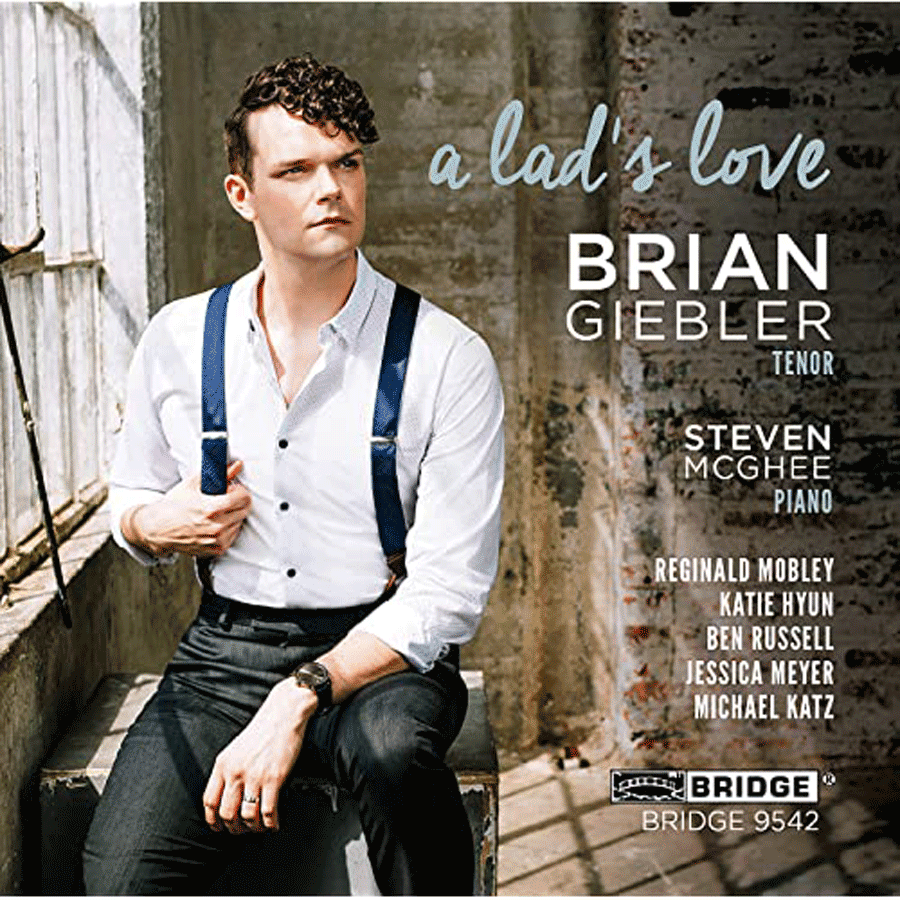
German composers had Goethe, Eichendorff and many others, the French had Baudelaire, Verlaine and more recent ones to set to music. Although long considered a "country without music", Britain had no shortage of poets who waited only for some inspired composers to set music to their verses. Fortunately, this is what happened in the 20th century. While there is no questioning the greatness of Benjamin Britten, it is high time that music lovers all over the world discovered the works of his predecessors and contemporaries, whose achievements, especially in the realm of art song, are indisputable.
It is to this kind of discovery that the recitals of British and American artists often invite us, when the performers have the intelligence to tap the huge reserve of British art songs. Most of them are baritones, but the association of Britten's compositions with Peter Pears' voice shows that tenors are also welcome in that field.
For his debut album, the young American tenor Brian Giebler offers a particularly attractive programme, where music lovers who want to get off the beaten track should find plenty to satisfy their curiosity, and perhaps even sharpen it further. The tenor is indeed very well accompanied, first by the excellent pianist Steven McGhee, but also, and this is where this CD stands out from many other song recitals, by a string quartet that intervenes during 25 of the 70 minutes that the disc totals. Monotony is also avoided thanks to the participation of a countertenor for one of the tracks, which we shall come back to later.
The programme opens very well, and we fully share Brian Giebler's enthusiasm for the Ludlow and Teme cycle by Ivor Gurney (1890–1937). Gurney was gassed during the First World War, shortly after composing "In Flanders", also recorded here, and was declared a victim of dementia in 1922, which fortunately did not entirely divert him from music. Published in the following year but conceived in 1919, Ludlow and Teme – named after an English town near Wales and the river that runs through it – gathers seven poems from A Shropshire Lad, a collection published in 1896 by A.E. Housman. They express a feeling of communion with nature (of a rural area where the poet had never set foot) and a kind of premonitory nostalgia for the untimely death of the young farmers, emanating from a discreet homoeroticism. The continuous presence of the string quartet, at times like an impalpable quivering carpet, at other times spiked with acidity, is the ingredient that spices up this composition, which deserves to be hailed among the most beautiful achievements of the insufficiently practiced genre of chamber ensemble art song.
Housman again for the composer who appears as the second pillar of this disc : John Ireland (1879–1962), represented by "Ladslove" which gives the recital its title, a song inspired by a poem from A Shropshire Lad, and by the triptych We'll to the Woods No More, where two late poems by Housman precede a piece for solo piano (the title of which comes from… A Shropshire Lad).
And it is again with A.E. Housman that the programme ends, with a very recent song by a living composer, the British Ian Venables (born in 1955). The fourth and last page of the cycle Songs of Eternity and Sorrow, based on posthumous poems by Housman, "Because I liked you better" also speaks of forbidden love. Here we find the same formation as in Ivor Gurney's work, the string quartet joining the piano to accompany the voice. The intensity of the emotion is carried by an extremely traditional but effective writing.
Two British composers of the first half of the 20th century are each summoned for one piece : Roger Quilter, with "Love's Philosophy" after Shelley, the earliest page in the programme (1905), and Peter Warlock with a charming song. But Benjamin Britten is quite inevitably the best served since, as has been said, he is also the composer who best served the tenor's voice. Two very different works are brought together here and occupy nearly half an hour of this disc : the second of his Canticles, dating from 1952, and a much rarer collection, Fish in the unruffled lakes, a group of early works composed between 1937 and 1940, created a dozen years after Britten's death, and collected by the publisher Boosey & Hawkes, who published them posthumously in 1997. In the Canticle, Brian Giebler changes into a patriarch, as Abraham ready to sacrifice his son ; Isaac was created by Kathleen Ferrier, but the role is now regularly sung by a countertenor, and Reginald Mobley manages to combine more dramatic accents with childlike purity. Still, the work comes as a surprise among these songs, where the accompanying text by pianist Steven McGhee underlines the guiding theme that seems to be decidedly that of homosexuality ; the presence of this Canticle is justified by invoking the the resemblance in the relationship between Abraham and his son and the one that unites Captain Vere with Billy Budd in the opera of the same name, composed shortly before. For Britten's bouquet of youthful songs, which may not have been meant to be published together, the theme is all the more understandable since the texts are by W.H. Auden and speak quite explicitly of a love that dares not say its name (Six Auden Settings would be a more neutral title, and more in line with reality). Ian Bostridge had recorded them as early as 1995 for Hyperion, as well as Philip Langridge, but they cannot be said to clutter up the discography : this new version is therefore welcome, for though they remained unpublished for a long time, they are quite up to the standards of early Brittenian production and should enrich the concert repertoire.
Beyond the pretext, what we notice above all is the clarity and freshness of Brian Giebler's timbre, in the service of a sensitivity that allows him to ideally translate the emotions of the various poems gathered here. The voice is healthy and supple, high and easy, and it is hoped that, defended by this promising young tenor, these songs will conquer the widest possible audience.

